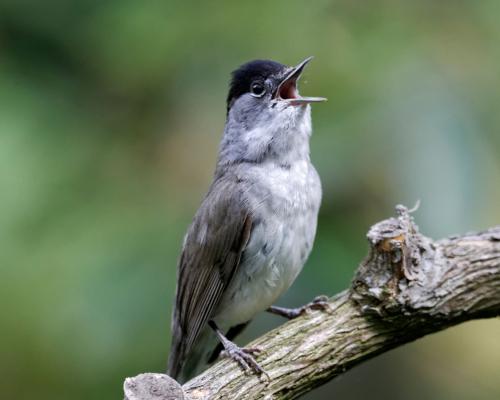
It’s not been the best week. I live with an energy-limiting illness, so after giving a series of talks on my new book, I’ve needed several days in bed. And while I’ve been resting, battling the boredom of fatigue, every morning and evening a blackcap has serenaded me through my open window. His song is sweet and clear, despite the background rumbling of trains, planes and automobiles. He reminds me of wilder places beyond my bedroom.
My first blackcap of the year was by the wet meadows back in February, a melodious yet puzzling song, given the season. I knew that a growing number of blackcaps were spending the winter in the UK, but hadn’t realised that they can sometimes be heard tuning up in readiness for the breeding season. We’ve certainly noticed more blackcaps around in midwinter in recent years. One memorable January, we spotted a male on our leafless apple espaliers during the Big Garden Birdwatch. We could only assume he was unaware of the mass exodus traditionally undertaken by garden birds as soon as 600,000 bird lovers reach for their binoculars on the last weekend in January.
These overwintering blackcaps aren’t, as one might assume, the same birds that breed in the UK, staying put after the warmer months. Instead, these individuals spend their summers on the continent then their winters here, rather than migrating to long-established wintering sites in the Mediterranean and north Africa. Studies initially suggested these birds migrate from central Europe, but more recent research shows they come from a wider area, including Spain and Poland, to take advantage of our warming winters and well-stocked garden feeders. Some are even evolving rounder wingtips, possibly due to leading more sedentary lifestyles.
Yet our estimated 10,000 overwintering blackcaps are just a fraction of those that undertake the more orthodox migration patterns and breed in the UK. These summer birds are abundant in Hertfordshire and they’ve nested in the scrub on the railway embankment across the road for some years now. This spring, though, I listened for the blackcap’s lilting notes in vain.
How wonderful, then, to hear this late-season songster. And how lucky I am that, no matter how exhausted I feel, birds never fail to intrigue and delight me.
• Under the Changing Skies: The Best of the Guardian’s Country Diary, 2018-2024 is published by Guardian Faber; order at guardianbookshop.com and get a 15% discount
• Nic’s new book, Land Beneath the Waves, is out now






